Rear Shock Absorbers
The 1983 Skinner Descender, which was also a pioneer in the use of disc brakes, used a motorcycle Honda XR200 Pro-Link shock, which had 16 compression settings and 4 rebound adjustments, which was originally made for Honda's 220 pound, 30HP “light weight” motocross racing motorcycle. The 1983 bicycle built with those shocks weighed 50 pounds and was lucky to get 1/2 HP powering it. Nonetheless, it was raced downhill and should get the prize as the first rear suspended mountain bike.
The next thirty years of suspension development has been spent on seeking the sweet spot of where and how to pivot rear suspension to achieve firm pedaling, plush riding, balanced handling - along with being strong, light & cheap.
Pre-Mountain Bike
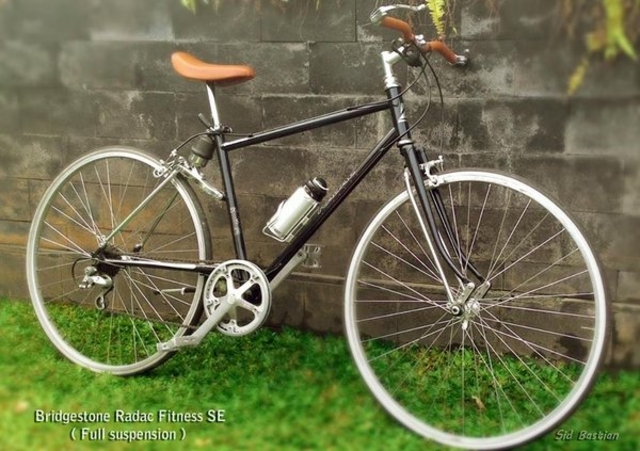
1980 Bridgestone Radac Fitness SE
bukalapak
Front and rear suspension, with rear elastometer shock absorbers.
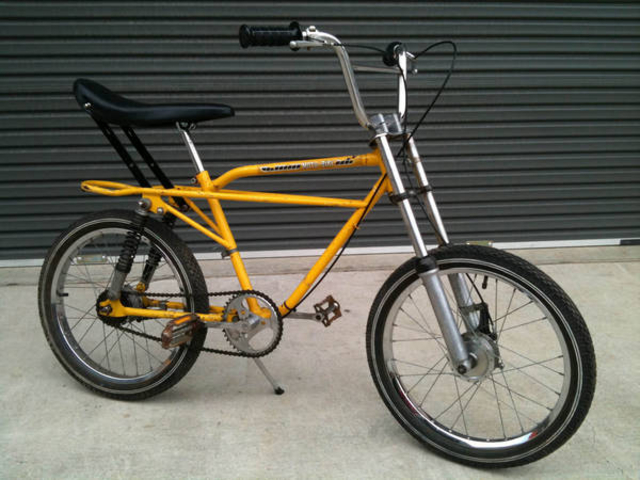
1975 Yamaha Moto-Bike
bmxmuseum
Fully suspended BMX with drum brakes. And those front forks are actually oil dampened shock absorbers! It was achingly close to being a decent downhill bike, but not really.
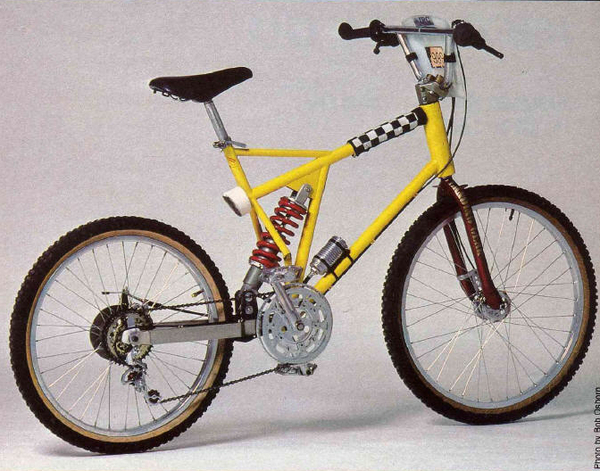
1983 MCR Skinner Descender
mombat
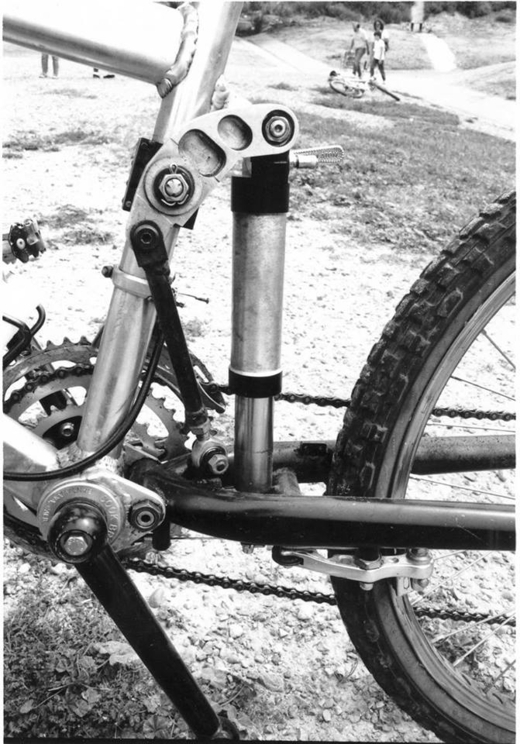
1984 MCR
smugmug
In 1984, the MCR lost 20 pounds and became the Skinny Descender at 30 pounds. Is that Aluminum?
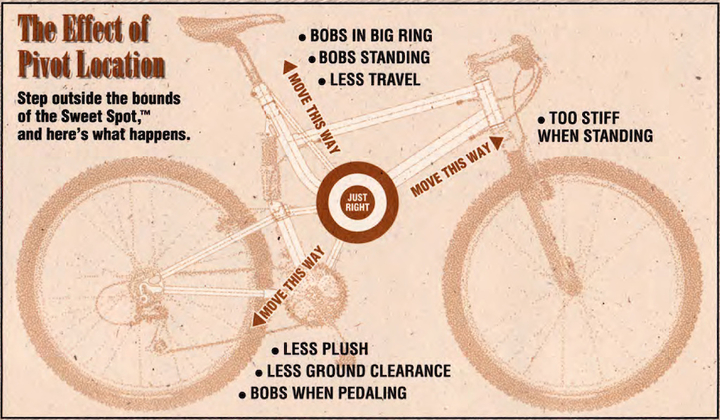
How to find the suspension Sweet Spot
pinkbike
Mountain Bike Specific Rear Shocks
By 1991 there were about ten manufacturers of fully suspended mountain bikes. The following is just a sample of early design styles.
The evolution of rear shocks continues today. Early shocks came close, but lagged in durability, weight, cost, and especially performance.
1985 Shuler Victor
Rear only spring. 1.5“ rear travel. No dampening. Springs customized for specific rider weight. 28 pounds.
Jerry Shuler would later make a similarly suspended Rogg Mountain Bike (1989), see mombat. Jerry later founded Boulder Bikes, which are next on the list:
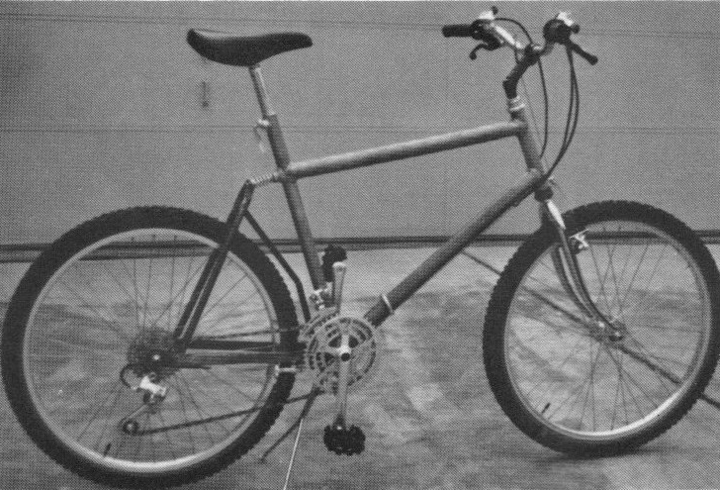
1985 Shuler Victor mombat
1988 Moulton AM-ATB
Leading link front, rubber bumpers rear and foldable for transport. Partially made by Kuwahara. Arguably the first “mass produced, full suspension mountain bike.”
Shimano 600SIS (1986-87), which only has a 28T capacity. 20” wheels. Only 361 AM-ATBs made between 1988 → 1992.1)
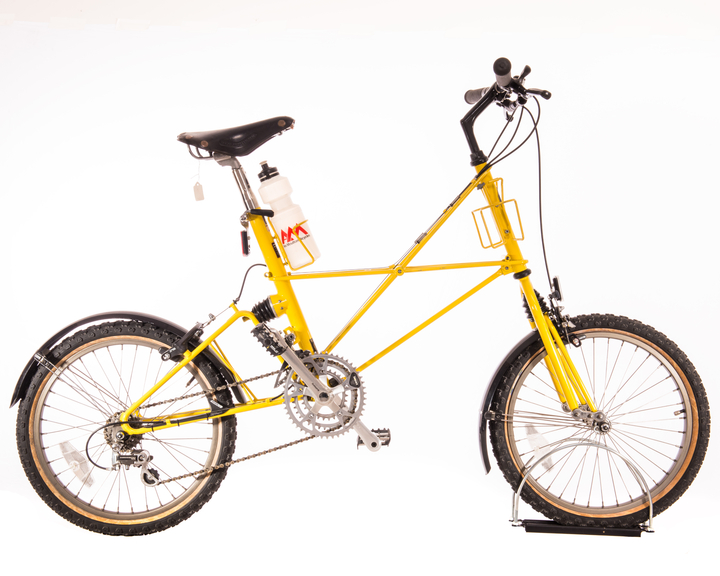
1988 Moulton AM-ATB bicyclemuseum
1989 Boulder Gazelle
Rear only spring.
Remote rear lockout on handlebars.
$2000.
2.6“ rear travel. First offered in 1989. See:
March 1989 Bicycle Guide
The pic is from a 1990 Gazelle. The 1989 did not have front suspension.
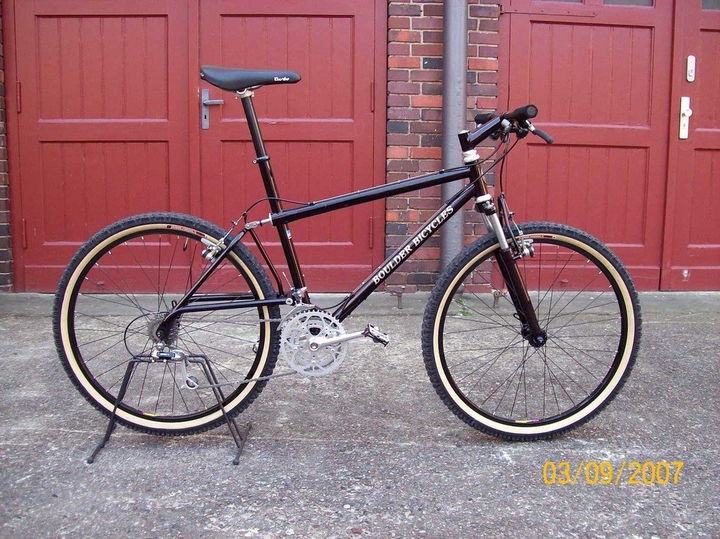
1990 Boulder Gazelle mtbr
1990 Offroad Pro-Flex RF-1
The “first commonly available full-suspension mountain bike”2). Elastometer single pivot rear with an Offroad Flex-Stem on the front, which counts as front suspension. $1500, 28 pounds, 2 inches of rear travel.
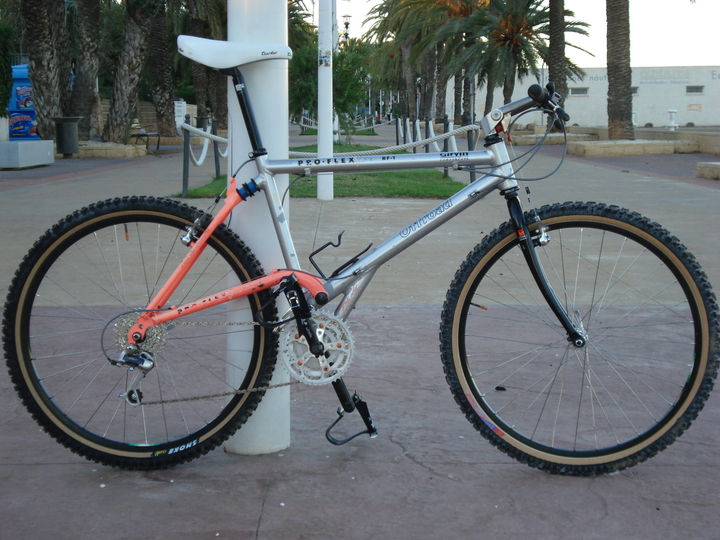
1990 Offroad Pro-Flex RF-1 flickr
1991 Moots YBB
Less than one inch of rear travel. Pivotless. Pivotless suspension remains popular today, as it's light weight, durable, and cheap but doesn't offer much in the way of travel and damping.
Moots still makes these. For $10,954!
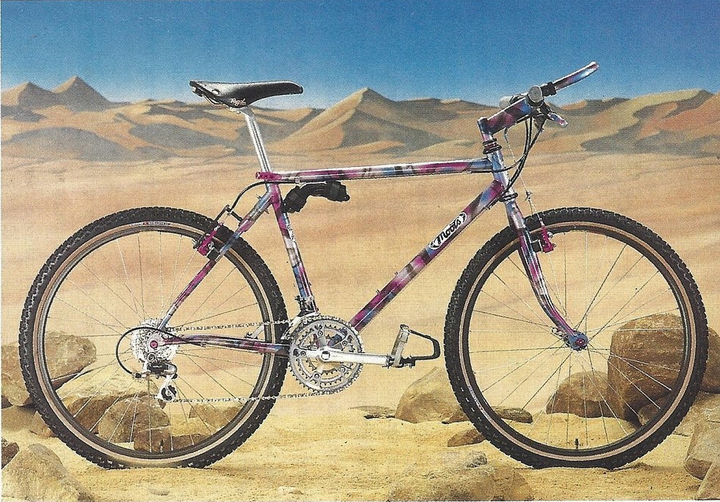
1991 Moots YBB bikeforums, Bicycling, April 1991
1991 Manitou
Manitou simply stuck their successful front shocks on the rear, with two pivots. Elastometer shocks.
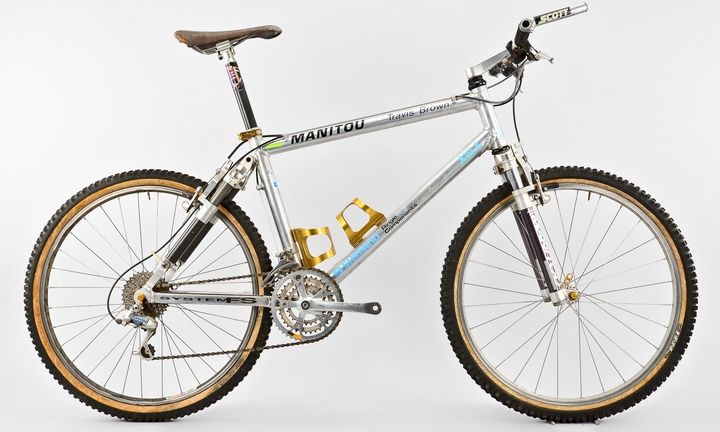
1991 Manitou theproscloset
1991 Fisher RS-1
Four pivots. Front air-oil damping, elastometer rears. Despite its name, the RS-1 did not use Rockshox RS-1's3) Note the very early use of disc brakes, using Hope disc brakes 4) and their matching hubs.
Mert Lawwill's5) father's personal bike.
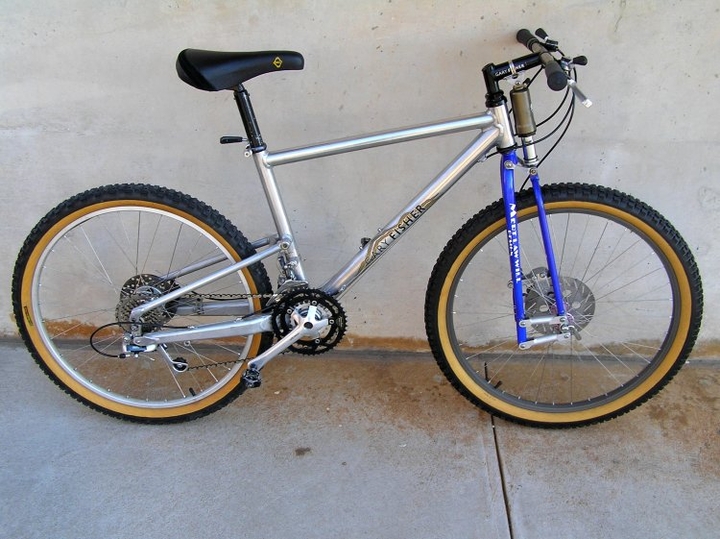
1991 Fisher RS-1 mombat
1993 AMP Research B-2
The Horst Link, introduced with the 1993 AMP Research B-2, has been hugely successful and the four pivot design remains in production today. The front shocks, not so much. 24 pounds!
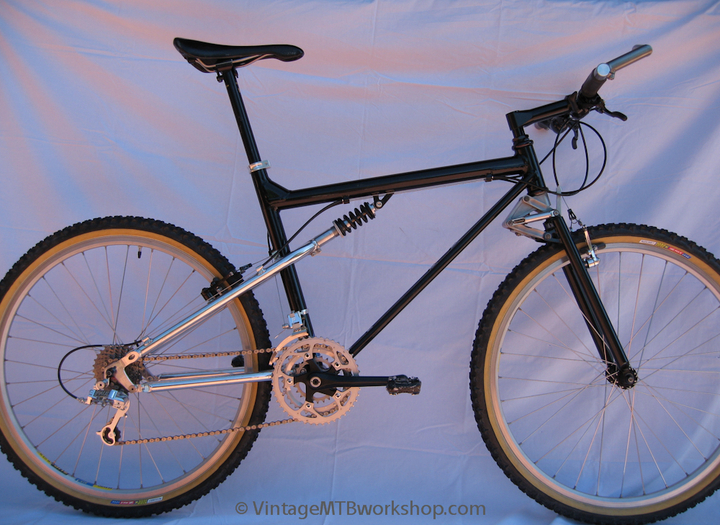
1993 AMP Research B-2 vintagemtbworkshop
1993 Yeti ARC ASLT
This design won many, many races and is very similar to today's designs.
Manitou 2/3/RockShox hybrid forks both in front and in back, with a single Risse damper. Low single pivot design in the back.
Missy Giove's personal racing machine.
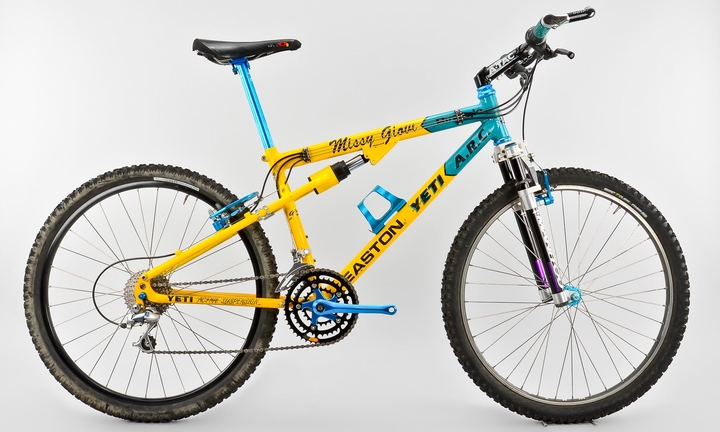
1993 Yeti ARC ASLT theproscloset
1994 Kestrel Rubicon Comp Kamikaze
A downhill racer with 8” of rear travel. The 63t chainring didn't pedal out until 50mph. The high seat was needed as downhill courses required a lot of pedaling in the 90's. Was it possible to lower the seat??
The long and slender swing-arm driving the rear suspension was laterally flexy, and it actually snapped during a race in 1994. The Pro's Closet
![]()
1994 Kestrel Rubicon Comp KamikazeThe Pro's Closet
1995 Ibis Szazbo
The first Unified Rear Triangle (URT) suspension bike. 5“ of travel. An evolutionary dead end.
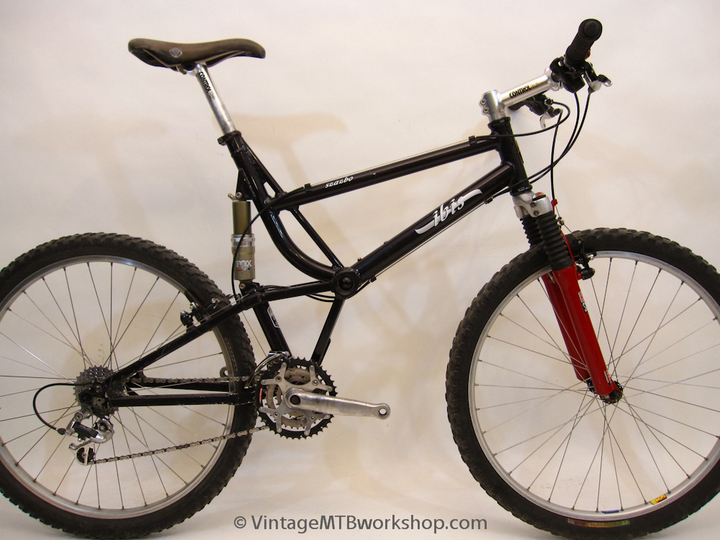
1995 Ibis Szazbo http://vintagemtbworkshop
1995 Dan/Ed
Just a big block of rubber by the square down-tube (the better to mount the block with.) Belt drive with an internal hub. To be fair, it's a very clean look.
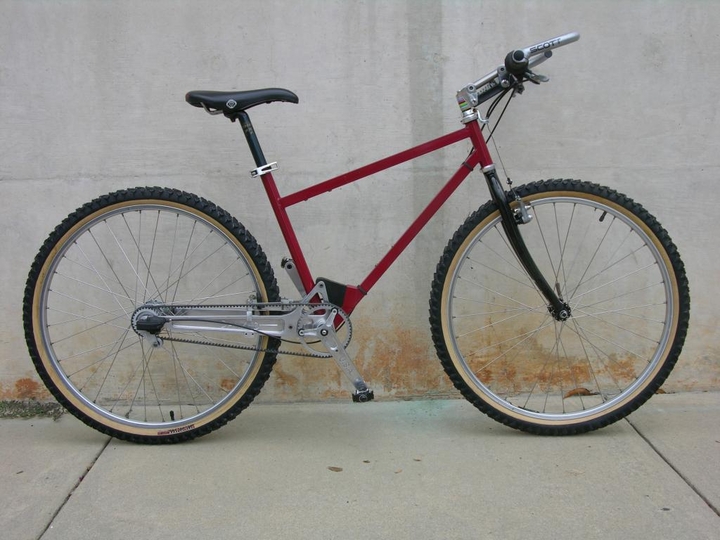
1995 Dan/Ed tumblr
1996 Moots DH88/Malcolm
The late 90's were a lost time in suspension design, with a lot of ideas tossed onto the dust heap of history. It's better to highlight just a few standouts, for one reason or another.
Obviously there's some wasted titanium here. Perhaps to humorously emphasize the ludicrousness of the design. It supposedly worked. The rear is pivot-less at the bottom bracket.
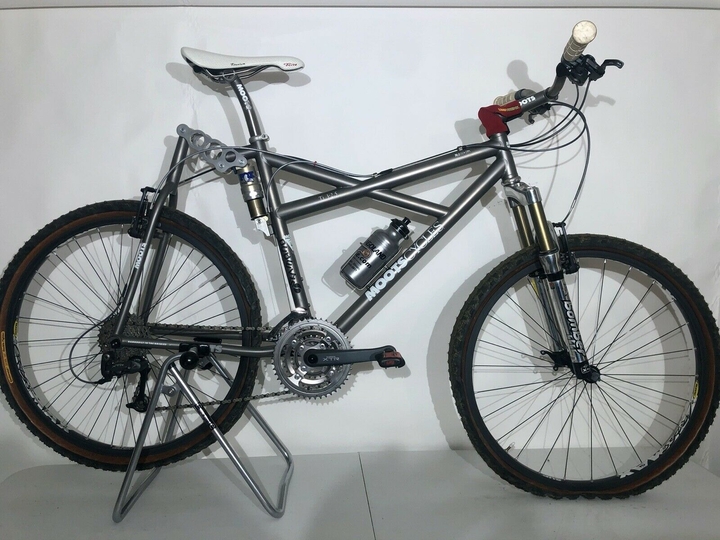
1996 Moots DH88/Malcolm ebay
1997 Ibis Bow Ti
The ultimate in extravagant, pivot-less design. Except that the shocks had a two way pivot as the thin wall titanium frame flexed so much. $3500, frame only. Five inches of travel.
The pic is a 1998.
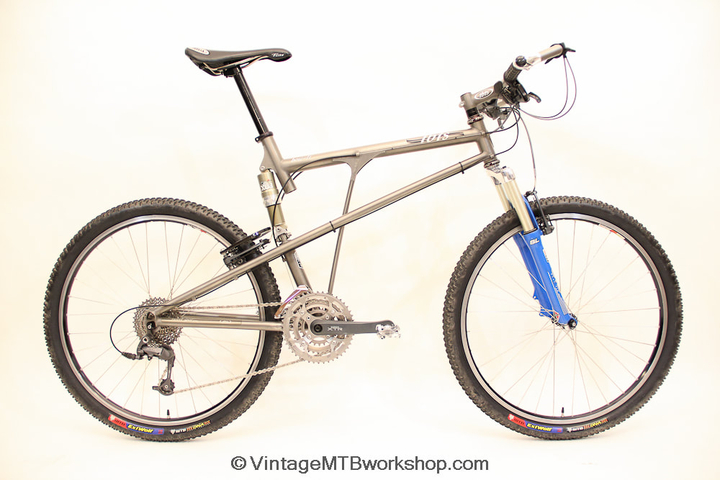
1998 Ibis Bow Ti vintagemtbworkshop
1998 Cannondale Fulcrum DH
By this point downhill bikes are designed completely differently than their cross country mountain bike ancestors. Weight is not an issue. Pedaling uphill is not a thing. And with race bikes, neither is cost. Their designs are worth a look, as they're sooo pretty…
The Fulcrum used three chains, and five cogs were in use at any time,
Ultimately, the Fulcrum DH was too heavy, a headache to maintain, and too expensive. It was estimated that each bike cost $20,000-30,000 to manufacture. The Fulcrum DH had the potential to be further refined, but unfortunately, the program was canceled after just two years. The Pro's Closet
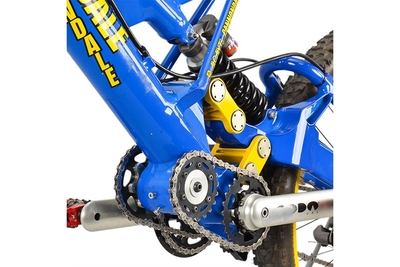
Drivetrain Detail theproscloset
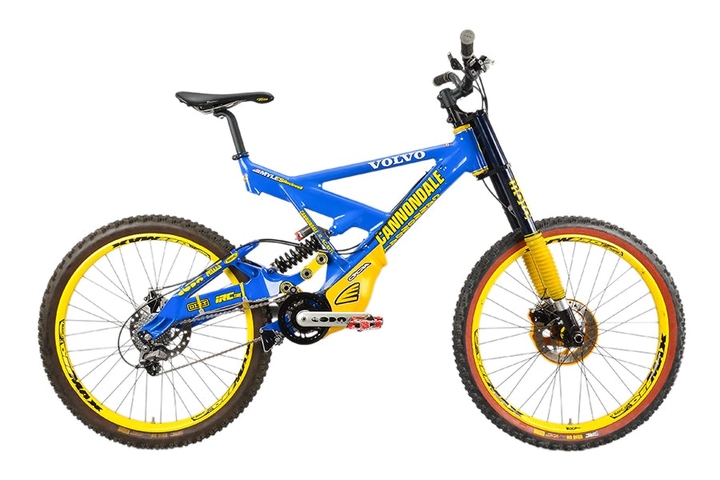
1998 Cannondale Fulcrum DH theproscloset
1940 Randonneur
Suspension pre-history and of mountain biking in general. Very early full suspension French randonneur.
Steel frame with lugs and brass fillets. Super Rapid 3-speed rear derailleur and shifters. Wooden rims. Front and rear spring shocks with rear pivots at both the bottom bracket and dropouts..
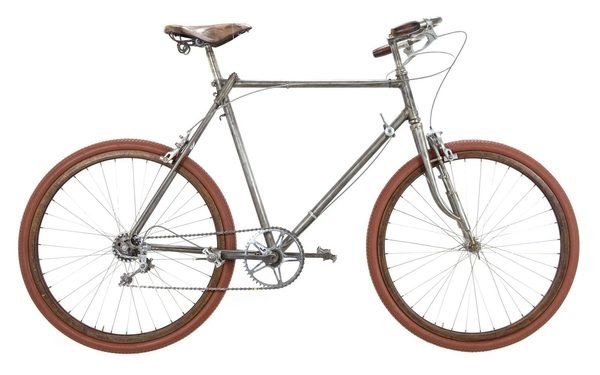
1940 Randonneur
steel-vintage